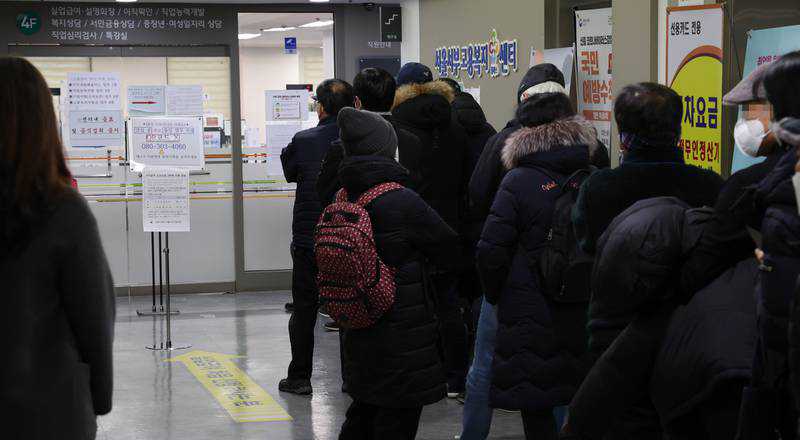Global unemployment expected to remain above pre-Covid levels until 2023, ILO says

Global unemployment is expected to remain above pre-coronavirus levels until at least 2023 as the pandemic continues to weigh heavily on global labour markets, according to a report by the International Labour Organisation, which revised last year’s projections.
The shortfall in working hours was equal to 52 million full-time jobs this year, the report said. The previous full-year estimate in May 2021 projected a deficit equal to 26 million full-time jobs.
While this latest projection is an improvement compared with the situation in 2021, it remains about 2 per cent below the number of global hours worked before the pandemic, according to the ILO World Employment and Social Outlook Trends report for 2022. “Two years into this crisis, the outlook remains fragile and the path to recovery is slow and uncertain,” said Guy Ryder, ILO director general.
“We are already seeing potentially lasting damage to labour markets, along with concerning increases in poverty and inequality. Many workers are being required to shift to new types of work, for example, in response to the prolonged slump in international travel and tourism.”
More than 207 million people are expected to be unemployed this year, compared to 186 million in 2019, the UN agency said. However, the real impact on employment could be "significantly greater than represented in these figures" since many people have left work, the ILO said.
The global labour force participation rate in 2022 is projected to remain 1.2 percentage points below that of 2019, the report said. There can be no real recovery from the pandemic without a broad-based labour market recovery and for it to be sustainable, the recovery must be based on the principles of decent work – including health and safety, equity, social protection and social dialogue, Mr Ryder said.
Labour markets in higher-income countries appeared to be recovering faster, although some were now beginning to face problems related to labour shortages, he said. Numerous factors appear to be driving the so-called "Great Resignation" reported in some countries. The crisis has also "led a significant number of people in the workforce to reconsider the employment that they have".
Female workers, particularly new entrants, were affected in the Arab states, which faced headwinds from the Covid-19 pandemic, the report said. Overall, the recovery in Arab states last year is considered to have been weak as gross domestic product grew by 2.2 per cent.
However, labour markets in the GCC countries have recovered faster than those in non-GCC countries owing to strong commodity price rises. Labour force participation is expected to surpass its pre-crisis level by 2022 in the GCC countries.
However, it is expected to remain below its 2019 level through 2023 in non-GCC countries, where it was particularly low to begin with, owing to significant barriers to female labour market participation.
Meanwhile, GCC economies are expected to grow at a faster pace in 2022 as they continue to recover from the pandemic on the back of higher oil prices and the expansion of their non-oil sectors, according to an Emirates NBD report released on Monday.
Gulf economies are forecast to grow by 5.1 per cent on average this year, from an expansion of 2.3 per cent in 2021 and a contraction of 4.9 per cent in the previous year when the pandemic began, Dubai’s biggest lender by assets said in the report, written by its chief economist and head of research, Khatija Haque.
The ILO said Arab states will have to urgently address structural barriers to the creation of what it called “decent work” in the aftermath of the pandemic and as rapid technological change continues to transform the world of work.
“More important than ever for the region today are structural transformation and diversification towards sectors that are more productive but also more labour intensive [through pro-employment macroeconomic policies, as well as structural and sectoral policies], together with the building and strengthening of labour market institutions and social protection systems,” the ILO said.
Changes such as the move towards greater reliance on informal self-employment, the rise in remote work and shifting trends in temporary work, "all risk impairing the quality of working conditions", the report said.
Only a "broad-based labour market recovery" would allow the world to truly recover from the pandemic, Mr Ryder said. "To be sustainable, this recovery must be based on the principles of decent work – including health and safety, equity, social protection and social dialogue," he said. "Without concerted and effective international and domestic policies, it is likely that in many countries it will take years to repair this damage," the ILO said.
Tags :
Previous Story
- As health concerns rise, car gadgets proliferate
- CES 2022: annual tech trade show to open...
- How to watch World Darts Championship: live stream...
- Profit recovery from pandemic to keep Tokyo stocks...
- CLIA statement regarding CDC elevating to Level 4...
- Why intelligent government action is needed to solve...
- Can India’s economy withstand a third Covid-19 wave?
- Hiring fraud! The 'talented' Mr Ripleys plaguing India...